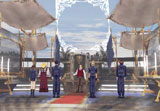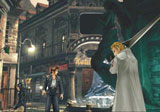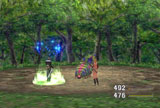 Much
has been debated about the validity of console games ported to the PC
platform. Most that I have run across suffer from serious deficiencies
in gameplay, graphic quality, and a general haphazardness in their
conversion, mostly leading to artifacts in graphics and sound. It is
interesting to note that when the switch is the other way around many of
the same problems abound, specifically critical differences in gameplay,
i.e. Quake II and Starcraft multi-play where there is no choice but to
share the same screen with your opponent, destroying all of the surprise
value that is so critical in the multi-play of those games. Titles
without multi-play options can also suffer from the transition from one
platform to another, for example, Final Fantasy VIII's second showing on
the PC platform. A lot has apparently been improved since the seventh
installment's debut on PC, but there is still a lot of work to be done
to make it worthy of competing against the stack of great RPG titles
that have emerged in the PC world in the last year, and the bigger stack
yet to come.
Much
has been debated about the validity of console games ported to the PC
platform. Most that I have run across suffer from serious deficiencies
in gameplay, graphic quality, and a general haphazardness in their
conversion, mostly leading to artifacts in graphics and sound. It is
interesting to note that when the switch is the other way around many of
the same problems abound, specifically critical differences in gameplay,
i.e. Quake II and Starcraft multi-play where there is no choice but to
share the same screen with your opponent, destroying all of the surprise
value that is so critical in the multi-play of those games. Titles
without multi-play options can also suffer from the transition from one
platform to another, for example, Final Fantasy VIII's second showing on
the PC platform. A lot has apparently been improved since the seventh
installment's debut on PC, but there is still a lot of work to be done
to make it worthy of competing against the stack of great RPG titles
that have emerged in the PC world in the last year, and the bigger stack
yet to come.
FFVIII
looks, well . . . crappy. Its not the worst I've come across, but I
still get miffed when I see gameplay graphics this poor on the PC. The
worst part of it is that there is almost nothing you can do about
it-your choice in screen resolutions is 640X480 16bpp full screen or
640X480 16bpp quarter screen, what kind of flippin' choice is
that? C'mon here, work with me! And the performance options offer
little improvement; to be honest I noticed no difference in gameplay or
graphics with all of the tabs on or all off.
 On
top of that, the most noticeable problem is the abundance of artifacts
that assault you on your screen, even more glaring if you are using a
high-end machine and a large monitor. Artifacts are those little
graphical or audio bits and pieces that stick out like a sore, bloody
thumb where they really don't look or sound like they belong. FFVIII
presents a never-ending game of Awhich one of these things is not like
the other. I was also plagued by numerous thin horizontal
discolored lines on the Field Screen and Battle Screen, which I was
never able to remedy through any method I tried. The way I managed to
beat all the graphical problems, to a certain small degree, was to go
out and buy a gamepad and sit as far away from the screen as the length
of its chord would permit.
On
top of that, the most noticeable problem is the abundance of artifacts
that assault you on your screen, even more glaring if you are using a
high-end machine and a large monitor. Artifacts are those little
graphical or audio bits and pieces that stick out like a sore, bloody
thumb where they really don't look or sound like they belong. FFVIII
presents a never-ending game of Awhich one of these things is not like
the other. I was also plagued by numerous thin horizontal
discolored lines on the Field Screen and Battle Screen, which I was
never able to remedy through any method I tried. The way I managed to
beat all the graphical problems, to a certain small degree, was to go
out and buy a gamepad and sit as far away from the screen as the length
of its chord would permit.
Thankfully
the FMV's don't suffer these problems and made it through the
transition well enough, though at times they chugged along with some
noticeable loss in framerates (even on a 750MHz machine with 128MG RAM
and a GeForce, what more can they ask for?!)
 Despite
all these near-blinding problems, FFVIII still manages to capture a
gamer's imagination, which says something about the longevity of the
series. This serial has gone through an evolution arguably as
significant as that of Ultima or Heroes of Might and Magic, following
the growth of technology with a handful of great games along the way. If
you can manage to come to terms with the visual problems, you'll be
treated to an ever-expanding well-thought-out world of fantasy and
magic, presented in the
unique aesthetic that is the trademark of the Final Fantasy series. The
conventions for gameplay may seem a little foreign to Final Fantasy
first-timers or those that have never played console RPGs. For instance,
all of the in-game dialog is handled in boxes, where you have to scroll
through entire conversations as fast as you can read them to get to the
exciting stuff. There is also a lot of very repetitive wandering and
searching for clues between battles. This brings me to the Junctioning
system that makes this installment different from previous Final Fantasy
games. The new way of fighting is a micro-management nightmare, cool
when it works, though a pain to learn and use. Don't expect anyone to
explain it to you coherently, you just have to mess with it a bunch
until you get the idea.
Despite
all these near-blinding problems, FFVIII still manages to capture a
gamer's imagination, which says something about the longevity of the
series. This serial has gone through an evolution arguably as
significant as that of Ultima or Heroes of Might and Magic, following
the growth of technology with a handful of great games along the way. If
you can manage to come to terms with the visual problems, you'll be
treated to an ever-expanding well-thought-out world of fantasy and
magic, presented in the
unique aesthetic that is the trademark of the Final Fantasy series. The
conventions for gameplay may seem a little foreign to Final Fantasy
first-timers or those that have never played console RPGs. For instance,
all of the in-game dialog is handled in boxes, where you have to scroll
through entire conversations as fast as you can read them to get to the
exciting stuff. There is also a lot of very repetitive wandering and
searching for clues between battles. This brings me to the Junctioning
system that makes this installment different from previous Final Fantasy
games. The new way of fighting is a micro-management nightmare, cool
when it works, though a pain to learn and use. Don't expect anyone to
explain it to you coherently, you just have to mess with it a bunch
until you get the idea.
